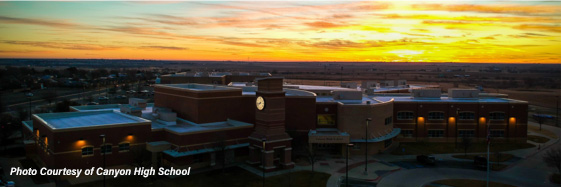
Sixteenth in a series on what to look for in college.
On February 2, 2017, I visited Canyon High School. A group of 600 students attended. Canyon ISD covers over 700 square miles of ground. With the onslaught of the COVID-19 virus, many people believe smaller college towns and the universities and the allied schools they serve will become extinct. They are wrong, particularly when a strong partnership exists between the local community, the independent school district and the regional university. In unison, aspirations for individuals and economic development potential for communities in the region are served in and through Canyon, Texas.
In Forbes this month, Derek Newton claims that smaller, close to home, regional universities may fare well in spite of COVID-19 concerns. He points out issues such as over-admissions, increased competition and reliance on international students that are confounding issues for universities like WT. Most importantly he opines, “All education is local,” parroting Tip O’Neill’s famous quip.
Valuable action that West Texas A&M University can take as an antidote is to pay attention to the communities of West Texas. This includes knowing the high schools, the leadership and their students. Canyon ISD is a large school district compared to the other districts in the Panhandle and Region 16, but it is “our” school. It helps build West Texas A&M University as a better institution of higher learning in the same way that a host of other committed independent school districts in the Texas Panhandle do.
Seventy percent of WT’s student body borrows to pay for school. This reflects the national average, but, fortunately, WT students borrow less than average. Borrowing may reduce the chance for a home loan in the future. “Thoughtful homeownership” is a vital part of the Jeffersonian Dream. Thoughtless homeownership, the kind that led to the bursting of the housing bubble in 2008, was driven by a number of forces that included a lax view by lending institutions regarding appropriate borrowing levels.
Vincent J. Cannato outlines the push and pull of home ownership in a National Affairs essay, “A Home of One’s Own,” a piece that doesn’t distinguish clearly between thoughtful and thoughtless homeownership. President Harry Truman glued together homeownership and higher education as key components of the G.I. Bill that would resettle and energize a nation coming home from war. Universities can ill afford to neglect the impact of over borrowing in pursuit of the American dream.
During my visit to Canyon High School, I suggested to the students, “If you have to borrow money to attend WT as a freshman or sophomore, please don’t come here, but graduate debt-free from a community college.”
One local leader in Canyon asked me if I feared firing for suggesting that students should not attend WT but go to a lower-priced community college. My simple-minded response: “For telling the truth?” The leadership of Chancellor John Sharp and the Board of Regents of The Texas A&M University System is rigorously focused on honest, forthright communication. Truthfulness and transparency are foundational burdens of effective service in a republic.
A local banker praised the position saying he too frequently had to deny mortgage loans to families due to over indebtedness from education loans. Being transparent is critical in gaining the trust of future students. Wherever their aspirations take them, their perception of our university’s integrity and honesty is paramount. I am betting my professional career that such relationships will prevail.
Panhandle pragmatism rules in Canyon, Texas. Education is both a value proposition and a valued proposition. Dollars and good sense work together where land, natural resources and agriculture are woven into an economy that cannot thrive without thoughtful utilization of all resources and the opportunities provided by them.
Seek a university that appreciates the fullness of the American Dream and sees a university education, when it is desired and earned, as only one element of that aspiration.
Walter V. Wendler is President of West Texas A&M University. His weekly columns are available at http://walterwendler.com/.
